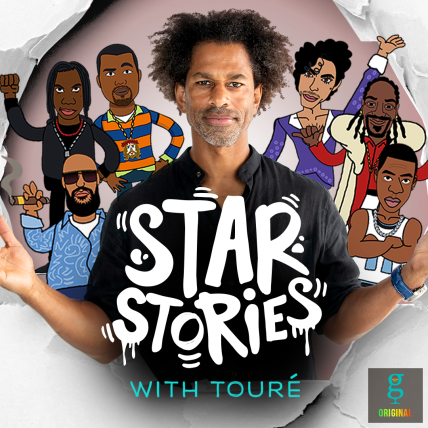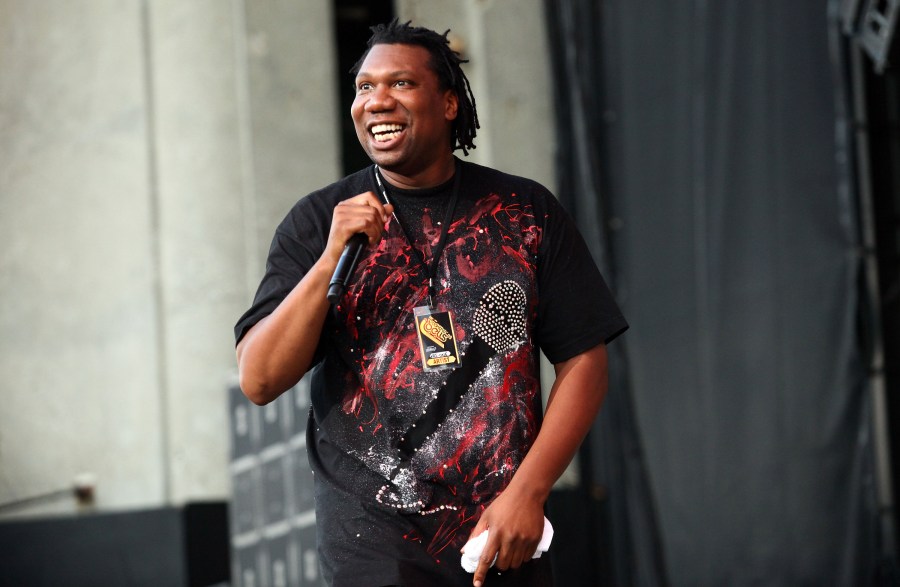
KRS-One is one of the legends of hip-hop, but before the fame, he was a teenage runaway who ended up in a homeless shelter. That became the source of his rap name and the place where he met his partner DJ Scott La Rock. Scott was a counselor at one of the shelters KRS stayed at. They talked about hip-hop, formed a duo that rewrote hip-hop history, and lifted KRS out of homelessness.

Full transcript below.
ANNOUNCER [00:00:00] You are now listening to theGrio’s Black Podcast Network Black Culture Amplified.
TOURE [00:00:05] I’m Toure. Star Stories is brought to you by theGrio Black Podcast Network. Home of The Blackest Questions with Dr. Chrissy Greer and Dear Culture with Panama Jackson. This episode of Star Stories is about KRS-One.
TOURE [00:00:25] KRS-One is one of the greatest emcees in hip-hop history. But before he became that, he was a homeless teenager. And the thing is, he became homeless by choice. Let’s go back to 1981. Ronald Reagan was president. Larry Bird won his first NBA title. Prince Charles and Princess Diana got married. And in Brooklyn, there was a 16-year-old kid living in the hood who would one day call himself KRS-One. This is about the time KRS-One was a homeless teenager. For now, let’s focus on this kid who is fiercely independent, highly intelligent and super self-confident. He knew for certain that he was going to grow up to be a star, and that affected everything he did. One night he got into an argument with his mother, and he grabbed a bag and ran away from home, never returned. He wasn’t going to let anyone tell him what to do. But he was 16, and he had no money. He went to the park, Prospect Park in Brooklyn, and he slept there. He ate out of dumpsters behind restaurants and pulled food from trash cans. He spent his days in the Brooklyn Library reading science, philosophy, and all kinds of esoteric, intellectual stuff. Mentally, he was working way harder than he would have in school. But for six whole months, he was a homeless teenager. One day in the park, he was sitting and meditating when he got a vision of himself walking across a bridge. So he got up. He walked over the Brooklyn Bridge into Manhattan. And when he got to the Manhattan side, he walked through the streets until he came to a long line of men waiting for something. He asked someone, “What are you waiting for?” He said they were waiting for food, free food. And that’s when KRS got introduced to the shelter system, which would eventually give him his name.
TOURE [00:02:41] But in the strangest way, see, when KRS was at his second or third shelter, he was going by his government name, which I won’t repeat, but it was something very common. One day a group of Hare Krishnas came by the shelter and said if anybody wanted to help them hand out fliers about the religion, they would give that person a meal. So our man went with them to hand out stuff and got a free meal. He did this several times until the guys back at the shelter began calling him Krishna. They meant it as a joke, but he loved it because it meant they were calling him the name of God. The level of self-belief he had in himself was so high that even then, as the kid in the shelter, he believed it was right for them to call him by the name of a god. A lot of Black people build their ego up to a crazy level, and that’s a beautiful thing because the Black ego is like a shield or like a forcefield protecting you from the missiles that white supremacy fires at you every day. A massive ego protects the Black self-esteem in the face of those attacks. In a society that tells you your Black ass ain’t nothing. A strong Black ego is a necessity for those who aspire to be great. As a homeless teenager, somehow, our man understood all of that and kept his Black ego cranked all the way up. He took on Krishna as a nickname, and in time it got shortened to Kris as in KRS, which is what most people who know him call him to this day. A little later, KRS began doing graffiti because spray painting on subway trains and walls was huge back then. Graffiti was everywhere in New York in the eighties, and KRS was a part of that movement, and when he tagged, he used the name KRS-1 as in the first and only KRS. He wrote that tag all over the city. And a few years later, in the midst of writing the song Criminal Minded, an idea came to his mind in a flash, and he wrote, “So take each letter of the KRS one means Knowledge Reigned Supreme Over Nearly Everyone.” It’s a backronym. But wait, let’s go back because Criminal Minded. The song was on his debut album, Criminal Minded, from when he was in a duo called Boogie Down Productions.
MUSIC [00:05:14] Boogie Down Production ductIon.
TOURE [00:05:17] And that duo is how KRS got out of the shelter system.
ANNOUNCER [00:05:22] Thank you for listening to Star Stories with Toure. If you like the show, you’ll love the animated version of the series. Watch the adult cartoon series Star Stories with Toure at the Grio.com on theGrio Black Podcast Network’s YouTube channel. You’ll find the video links in the description section of this episode.
TOURE [00:05:39] Criminal Minded. The song was on his debut album, Criminal Minded, from when he was in a duo called Boogie Down Productions. And that duo is how Chris got out of the shelter system. See, when he got to his third or fourth shelter, there was this social worker there who said he was into rap. KRS didn’t really believe it. The guy said he was a deejay. KRS really didn’t believe it. The guy said, Look, I don’t have to prove anything to you, but I’m spinning at this club tonight. Come see me. So KRS took the subway there with tokens that the social worker gave him, and he got in the club, and he sees this incredible scene. And at the center of it, all is the deejay. And it’s the social worker, DJ Scott La Rock. And at that moment, Boogie Down Productions was born with KRS as the emcee and Scott La Rock as the deejay. But a little while later, a rapper named M.C. Shan put out a pretty dope song called The Bridge that got a lot of radio play and club play, and street attention. It was a hot record at that point. M.C. Shan was one of the biggest rappers in the culture. He was a star as far as mid-eighties rap goes. The Bridge was all about the Queensbridge Projects, where Shan was from, and the song starts with the lines, “You love to hear the stories again and again about all got started way back when.
TOURE [00:07:17] The monument is right in your face. Sit and listen for a while to the name of the place, The Bridge”. Now, it sure sounds like he was saying hip-hop began in Queens. It did not. It started in the Bronx. And KRS had been living in the shelters in the Bronx for a while by then. So even though he grew up in Brooklyn, he was feeling very protective of the Bronx. And he always loved being in the role of the teacher. So he wasn’t going to miss a chance to teach. He recorded a furious response to The Bridge called “South Bronx,” an amazing diss record. Early on in the record, KRS says. “So you think that hip hop had its start out in Queensbridge? If you pop that junk up in the Bronx, you might not live.” Woah, now you have to understand how insane this record was. M.C. Shan was one of the biggest names in rap. KRS was an unknown person living in a homeless shelter, and yet he was firing heat-seeking missiles at the throne of hip-hop. It was like David going up against Goliath. But you know how that one ended. South Bronx was devastating to Shan. It played all over the place, and suddenly everyone who cared about rap knew KRS’s name. Shan ran to the studio and fired back with an okay song called “Kill That Noise.” He would have been better off saying nothing because KRS said, Well, allow me to retort.” And he went into the studio, and he recorded “The Bridge is Over” an unbelievable diss record where he says, “Manhattan keeps on making it. Brooklyn keeps on taking it. Bronx keeps creating it. And Queens keeps on faking it”. That was it—a knockout blow. Shan, well, his career never really recovered, and KRS’s life changed forever. He instantly became a rap star. He had made good on his childhood vision, his certainty that he would become a superstar. He went from near homeless to stardom fairly quickly. He did that because he believed in himself to such a deep extent that he believed his success was prophecy ordained. It was his destiny which only made him believe in himself even more, even when Chris had no real reason to believe in himself. Back when he was a homeless teen who knew no one in the world of music and had never even been inside a studio, he still believed in himself and its self-belief and his rock solid ego that were the batteries that powered his ascent from the bottom to the top. It’s almost like, against all odds, KRS One willed himself into being.
TOURE [00:10:24] Star Stories is brought to you by theGrio Black Podcast Network, home of theGrio Daily with Michael Harriot and Writing Black with Maiysha Kai. If you like this episode of Star Stories, check out the one about Suge Knight. Remember to rate and review. It Matters. I’m Toure.
Maiysha Kai [00:10:46] We started this podcast to talk about not just what Black writers write about but how.
Guest Ayana Gray [00:10:51] Well, personally, it’s on my bucket list to have one of my books banned. I know that’s probably bad, but I think.
Maiysha Kai [00:10:58] Ooh! Spicy!
Guest Charlayne Hunter-Gault [00:10:58] They were yelling N-word, go home. And I was looking around. For the N-word because I knew it couldn’t be me because I was the queen.
Guest Keith Boykin [00:11:05] I’m telling people to quit this mentality of identifying ourselves by our work and to start to live our lives, and to redefine the whole concept of how we work and where we work, and why we work in the first place.
Guest Missy Copeland [00:11:21] My biggest strength throughout, throughout my career has been having incredible mentors and specifically black women.
Guest Omar Epps [00:11:27] I’ve been writing poetry since I was like eight. I’ve been reading Langston Hughes and James Baldwin and Maya Angelou and so forth and so on, since I was like a little kid.
Guest Rhiannon Giddens [00:11:36] Like, the banjo was like black, right? For many, many, many years everybody knew.
Guest Sam Jay [00:11:42] Because sometimes, I’m just doing some shit because I just want to do it
Guest J. Ivy [00:11:49] Honored to be here. Thank you for doing the work that you do. Keep shining bright. And like you said, we all keep Writing Black.
Maiysha Kai [00:11:56] As always, you can find us onthe Grio app or wherever you find your podcasts.
